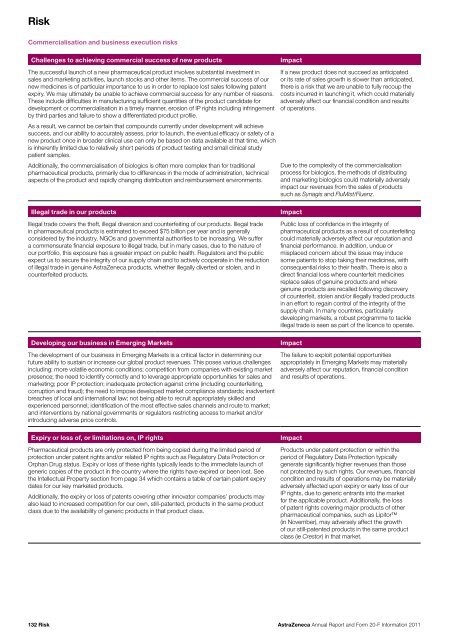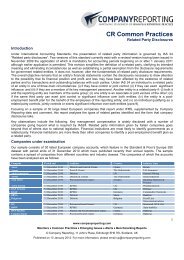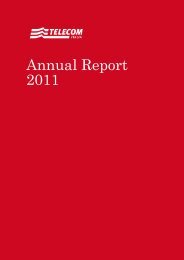RiskCommercialisation <strong>and</strong> business execution risksChallenges to achieving commercial success of new productsThe successful launch of a new pharmaceutical product involves substantial investment insales <strong>and</strong> marketing activities, launch stocks <strong>and</strong> other items. The commercial success of ournew medicines is of particular importance to us in order to replace lost sales following patentexpiry. We may ultimately be unable to achieve commercial success for any number of reasons.These include difficulties in manufacturing sufficient quantities of the product c<strong>and</strong>idate fordevelopment or commercialisation in a timely manner, erosion of IP rights including infringementby third parties <strong>and</strong> failure to show a differentiated product profile.As a result, we cannot be certain that compounds currently under development will achievesuccess, <strong>and</strong> our ability to accurately assess, prior to launch, the eventual efficacy or safety of anew product once in broader clinical use can only be based on data available at that time, whichis inherently limited due to relatively short periods of product testing <strong>and</strong> small clinical studypatient samples.Additionally, the commercialisation of biologics is often more complex than for traditionalpharmaceutical products, primarily due to differences in the mode of administration, technicalaspects of the product <strong>and</strong> rapidly changing distribution <strong>and</strong> reimbursement environments.ImpactIf a new product does not succeed as anticipatedor its rate of sales growth is slower than anticipated,there is a risk that we are unable to fully recoup thecosts incurred in launching it, which could materiallyadversely affect our financial condition <strong>and</strong> resultsof operations.Due to the complexity of the commercialisationprocess for biologics, the methods of distributing<strong>and</strong> marketing biologics could materially adverselyimpact our revenues from the sales of productssuch as Synagis <strong>and</strong> FluMist/Fluenz.Illegal trade in our productsIllegal trade covers the theft, illegal diversion <strong>and</strong> counterfeiting of our products. Illegal tradein pharmaceutical products is estimated to exceed $75 billion per year <strong>and</strong> is generallyconsidered by the industry, NGOs <strong>and</strong> governmental authorities to be increasing. We suffera commensurate financial exposure to illegal trade, but in many cases, due to the nature ofour portfolio, this exposure has a greater impact on public health. Regulators <strong>and</strong> the publicexpect us to secure the integrity of our supply chain <strong>and</strong> to actively cooperate in the reductionof illegal trade in genuine <strong>AstraZeneca</strong> products, whether illegally diverted or stolen, <strong>and</strong> incounterfeited products.ImpactPublic loss of confidence in the integrity ofpharmaceutical products as a result of counterfeitingcould materially adversely affect our reputation <strong>and</strong>financial performance. In addition, undue ormisplaced concern about the issue may inducesome patients to stop taking their medicines, withconsequential risks to their health. There is also adirect financial loss where counterfeit medicinesreplace sales of genuine products <strong>and</strong> wheregenuine products are recalled following discoveryof counterfeit, stolen <strong>and</strong>/or illegally traded productsin an effort to regain control of the integrity of thesupply chain. In many countries, particularlydeveloping markets, a robust programme to tackleillegal trade is seen as part of the licence to operate.Developing our business in Emerging MarketsThe development of our business in Emerging Markets is a critical factor in determining ourfuture ability to sustain or increase our global product revenues. This poses various challengesincluding: more volatile economic conditions; competition from companies with existing marketpresence; the need to identify correctly <strong>and</strong> to leverage appropriate opportunities for sales <strong>and</strong>marketing; poor IP protection; inadequate protection against crime (including counterfeiting,corruption <strong>and</strong> fraud); the need to impose developed market compliance st<strong>and</strong>ards; inadvertentbreaches of local <strong>and</strong> international law; not being able to recruit appropriately skilled <strong>and</strong>experienced personnel; identification of the most effective sales channels <strong>and</strong> route to market;<strong>and</strong> interventions by national governments or regulators restricting access to market <strong>and</strong>/orintroducing adverse price controls.ImpactThe failure to exploit potential opportunitiesappropriately in Emerging Markets may materiallyadversely affect our reputation, financial condition<strong>and</strong> results of operations.Expiry or loss of, or limitations on, IP rightsPharmaceutical products are only protected from being copied during the limited period ofprotection under patent rights <strong>and</strong>/or related IP rights such as Regulatory Data Protection orOrphan Drug status. Expiry or loss of these rights typically leads to the immediate launch ofgeneric copies of the product in the country where the rights have expired or been lost. Seethe Intellectual Property section from page 34 which contains a table of certain patent expirydates for our key marketed products.Additionally, the expiry or loss of patents covering other innovator companies’ products mayalso lead to increased competition for our own, still-patented, products in the same productclass due to the availability of generic products in that product class.ImpactProducts under patent protection or within theperiod of Regulatory Data Protection typicallygenerate significantly higher revenues than thosenot protected by such rights. Our revenues, financialcondition <strong>and</strong> results of operations may be materiallyadversely affected upon expiry or early loss of ourIP rights, due to generic entrants into the marketfor the applicable product. Additionally, the lossof patent rights covering major products of otherpharmaceutical companies, such as Lipitor(in November), may adversely affect the growthof our still-patented products in the same productclass (ie Crestor) in that market.132 Risk<strong>AstraZeneca</strong> <strong>Annual</strong> <strong>Report</strong> <strong>and</strong> <strong>Form</strong> <strong>20</strong>-F <strong>Information</strong> <strong>20</strong>11
Commercialisation <strong>and</strong> business execution risks continuedPressures resulting from generic competitionOur products compete not only with other products approved for the same condition, marketedby research-based pharmaceutical companies but also with generic drugs marketed by genericpharmaceutical manufacturers. These competitors may invest more of their resources into themarketing of their products than we do depending on the relative priority of these competitorproducts within their company’s portfolio. Generic versions of products are often sold at lowerprices than br<strong>and</strong>ed products as the manufacturer does not have to recoup the significant costof R&D investment <strong>and</strong> market development. All our patented products, including Nexium,Crestor <strong>and</strong> Seroquel are subject to price pressures as a result of competition from genericcopies of these products <strong>and</strong> from generic forms of other drugs in the same product class.As well as facing generic competition upon expiry or loss of IP rights, we also face the risk thatgeneric drug manufacturers seek to market generic versions of our products prior to expiriesof our patents <strong>and</strong>/or the Regulatory Exclusivity periods. For example, we are currently facingchallenges in the US from numerous generic drug manufacturers regarding our patents forSeroquel XR, Nexium <strong>and</strong> Crestor, three of our best selling products. Generic manufacturersmay also take advantage of the failure of certain countries to properly enforce Regulatory DataProtection <strong>and</strong> may launch generics during this protected period. This is a particular risk in someEmerging Markets where appropriate patent protection may be difficult to obtain or enforce.ImpactIf challenges to our patents by generic drugmanufacturers succeed <strong>and</strong> generic products arelaunched, or generic products are launched ‘at risk’on the expectation that challenges to our IP will besuccessful, this may materially adversely affect ourfinancial condition <strong>and</strong> results of operations. In <strong>20</strong>11,US sales for Seroquel XR, Nexium <strong>and</strong> Crestorwere $779 million, $2,397 million, <strong>and</strong> $3,074 millionrespectively. Furthermore, if limitations on theavailability, scope or enforceability of patentprotection are implemented in jurisdictions inwhich we operate, generic manufacturers in thesecountries may be increasingly able to introducecompeting products to the market earlier than theywould have been able to, had more robust patentor Regulatory Data Protection been available.Effects of patent litigation in respect of IP rightsAny of the IP rights protecting our products may be asserted or challenged in IP litigationinitiated against or by alleged infringers. Such IP rights may be affected by validity challengesin patent offices. Regardless, we expect our most valuable products to receive the greaternumber of challenges. Despite our efforts to establish <strong>and</strong> defend robust patent protectionfor our products, we may not succeed in protecting our patents from such litigation orother challenges.We also bear the risk that we may be found to infringe patents owned or licensed exclusivelyby third parties, including research-based <strong>and</strong> generic pharmaceutical companies <strong>and</strong>individuals. Infringement accusations may implicate, for example, our manufacturing processes,product intermediates or use of research tools. Details of significant infringement claims againstus by third parties enforcing IP rights can be found in Note 25 to the Financial Statements frompage 181.Price controls <strong>and</strong> reductionsMost of our key markets have experienced the implementation of various cost control orreimbursement mechanisms in respect of pharmaceutical products. For example, in the US,realised prices are being depressed through cost-control tools such as restricted lists <strong>and</strong>formularies, which employ ‘generic first’ strategies <strong>and</strong> require physicians to obtain priorapproval for the use of a br<strong>and</strong>ed medicine where a generic version exists. These mechanismsput pressure on manufacturers to reduce prices <strong>and</strong> to limit access to br<strong>and</strong>ed products. Manyof these mechanisms shift a greater proportion of the cost of medicines to the individual viaout-of-pocket payments at the pharmacy counter. The patient out-of-pocket spend is generallyin the form of a co-payment or, in some cases, a co-insurance, which is designed, principally,to encourage patients to use generic medicines.Concurrently, many markets are adopting the use of Health Technology Assessment (HTA)to provide a rigorous evaluation of the clinical efficacy of a product, at or post launch. HTAevaluations are also increasingly being used to assess the clinical as well as the costeffectiveness of products in a particular health system. This comes as payers <strong>and</strong> policy makersattempt to drive increased efficiencies in the use <strong>and</strong> choice of pharmaceutical products.A summary of the principal aspects of price regulation <strong>and</strong> how price pressures are affectingour business in our most important markets is set out in the Geographical Review from page 77<strong>and</strong> these economic pressures are also further discussed below in the following risk factor.ImpactIf we are not successful in maintaining exclusiverights to market one or more of our major products,particularly in the US where we achieve our highestrevenue, our revenue <strong>and</strong> margins could bematerially adversely affected.Managing or litigating infringement disputes overso-called ‘freedom to operate’ can be costly. Wemay be subject to injunctions against our productsor processes <strong>and</strong> be liable for damages or royalties.We may need to obtain costly licences. These risksmay be greater in respect of biologics <strong>and</strong> vaccines,where patent infringement claims may relate toresearch tools, methods <strong>and</strong> biological materials.While we seek to manage such risks by, for example,acquiring licences, foregoing certain activities oruses, or modifying processes to avoid infringementclaims <strong>and</strong> permit commercialisation of ourproducts, such steps entail significant cost <strong>and</strong>there is no guarantee that they will be successful.ImpactDue to these pressures on the pricing of ourproducts, there can be no certainty that we willbe able to charge prices for a product that, in aparticular country or in the aggregate, enable usto earn an adequate return on our productinvestment. These pressures, including theincreasingly restrictive reimbursement policies towhich we are subject <strong>and</strong> the potential adoption ofnew legislation exp<strong>and</strong>ing the scope of permittedcommercial importation of medicines into the US,could materially adversely affect our financialcondition <strong>and</strong> results of operations.We expect that these pressures on pricing willcontinue, <strong>and</strong> there can be no assurance that theywill not increase.Corporate Governance<strong>AstraZeneca</strong> <strong>Annual</strong> <strong>Report</strong> <strong>and</strong> <strong>Form</strong> <strong>20</strong>-F <strong>Information</strong> <strong>20</strong>11Risk 133










